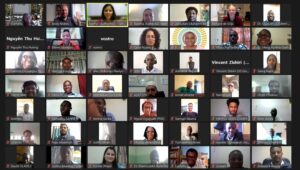Bangladesh: A country with huge research potential
Nafiz Zaman Shuva is an Assistant Professor of the Department of Information Science & Library Management, University of Dhaka and the President of Bangladesh Association of Young Researchers (BAYR). He is the Managing Editor of the Journal of the Bangladesh Association of Young Researchers (JBAYR) and The Eastern Librarian
Bangladeshi researchers are continuously struggling to ensure their presence in the world of research. Being a faculty member of the University of Dhaka (the largest and oldest public university in Bangladesh) and being the President of Bangladesh Association of Young Researchers (the only national youth research and development association), Bangladeshi authors and researchers are always sharing their experiences with me. These experiences have raised issues such as: the University of Dhaka is still unable to offer relevant information resources, especially online journals and e-books, to faculty members and students; we are also unable to offer a Virtual Private Network (VPN) service to our users; and the university library cannot digitize its collection and convert into a ‘Digital Library’. The majority of public universities are in the same position. This includes Rajshahi University Library, which, despite having a huge collection of research worthy materials, is unable to digitize.
Currently, the Bangladesh INASP-PERii Consortium (BIPC) offers low-priced access to e-resources for almost 50 institutions. This initiative deserves appreciation due to the fact that without it Bangladeshi libraries wouldn’t be able to get access to a large number of online databases. Recently, the University Grants Commission (UGC) initiated consortium based e-resource subscriptions for the academic libraries in Bangladesh. The aim is to subscribe to the resources that BIPC is not already subscribing to. This is also undoubtedly a good initiative from the UGC. However, if we analyze the current members of BIPC we will see that about 50% of the public university libraries in Bangladesh are lacking access to e-resources and about 70% of private universities are unable to offer subscription-based e-resources to their faculty members and students. While conducting a study on this, I tried to determine why, after charging huge tuition fees, private universities in Bangladesh are not offering expected modern library services to its faculty members.
I had several discussions, formal and informal, with the librarians working in different private universities and found that the university administration is not very interested in library aspects. However, they are interested in investing money in advertisements focused on increasing the student intake. I was shocked. I abhor the policies of some of these private universities. They don’t think about positive impact of research output. They should invest more in research and development initiatives which would undoubtedly increase their standards as an educational institution. UGC should come forward and put pressure on the developing education standard of public and private universities in Bangladesh.
Tomorrow Nafiz looks at the publishing research in Bangladesh in ‘Bangladesh: A country with huge publishing potential‘.





Very interesting, as one would think that being able to offer a wide range of up-to-date electronic library resources would in itself be an advertisement for new students, but also, and possibly more importantly, a way to attract academics and post-graduate researchers to the institution.
Obviously Bd UGC should take necessary actions against those universities and put pressure on the developing research based tertiary education standard in Bangladesh.
“The university administration is not very interested in library aspects. However, they are interested in investing money in advertisements focused on increasing the student intake”…………its absolutely right and i believe that only UGC can take initial step to reduce these problems.